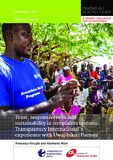| dc.contributor.author | Feruglio, Francesca | |
| dc.contributor.author | Misoi, Abrahams | |
| dc.coverage.spatial | Kenya | en |
| dc.date.accessioned | 2017-11-02T13:22:54Z | |
| dc.date.available | 2017-11-02T13:22:54Z | |
| dc.date.issued | 2017-11 | |
| dc.identifier.citation | Feruglio, F. and Misoi, A. (2017) Trust, responsiveness and sustainability in complaints systems: Transparency International’s experience with Uwajibikaji Pamoja, Brighton: IDS. | en |
| dc.identifier.uri | https://opendocs.ids.ac.uk/opendocs/handle/20.500.12413/13327 | |
| dc.description.abstract | Kenya’s arid and semi-arid regions have faced recurrent drought, famine, and inter-community conflicts. High levels of need have led to large humanitarian relief programmes involving government and national and international nongovernmental organisations (NGOs). This is the context in which Transparency International Kenya (TI-Kenya)’s Uwajibikaji Pamoja (Accountability Together) programme emerged. Uwajibikaji Pamoja is an integrated complaints referral mechanism run by TI-Kenya in partnership with more than 40 service providers, including government and development aid agencies. The system allows citizens to lodge complaints about gaps in access to a range of services provided by the government and humanitarian agencies, through a toll-free SMS line, email and walk-ins, from where the complaint is then referred to the relevant provider. The system then follows up with complainants and provides information on the status of their feedback. It is designed to complement internal feedback mechanisms set up by partners, where these exist, by making submission and receipt of complaints easier, less costly and less time-consuming. This paper summarises the process and findings of practitioner research to assess the effectiveness of Uwajibikaji Pamoja and how technology has facilitated the system. These findings indicate that the wide range of government and NGO bodies involved in Uwajibikaji Pamoja have made significant changes to their processes for dealing with and responding to complaints as a result of the TI-Kenya report’s recommendations. Ensuring responsiveness requires building trust and commitment among beneficiary communities, but it also requires service providers to understand how citizens’ feedback can benefit service delivery and management. | en |
| dc.description.sponsorship | DFID | en |
| dc.description.sponsorship | USAID | en |
| dc.description.sponsorship | Sida | en |
| dc.description.sponsorship | Omidyar Network | en |
| dc.language.iso | en | en |
| dc.publisher | Instiute of Development Studies | en |
| dc.relation.ispartofseries | Making All Voices Count Practice Papers; | |
| dc.rights.uri | http://creativecommons.org/licenses/by-nc-sa/4.0/ | en |
| dc.subject | Governance | en |
| dc.subject | Participation | en |
| dc.subject | Technology | en |
| dc.title | Trust, responsiveness and sustainability in complaints systems: Transparency International’s experience with Uwajibikaji Pamoja | en |
| dc.type | Series paper (non-IDS) | en |
| dc.rights.holder | Institute of Development Studies | en |
| rioxxterms.funder | Default funder | en |
| rioxxterms.identifier.project | Default project | en |
| rioxxterms.version | NA | en |
| rioxxterms.funder.project | 9ce4e4dc-26e9-4d78-96e9-15e4dcac0642 | en |


